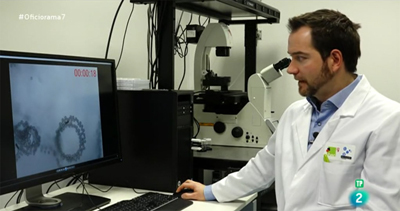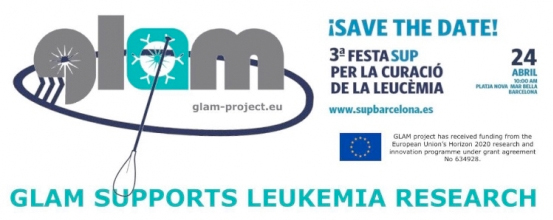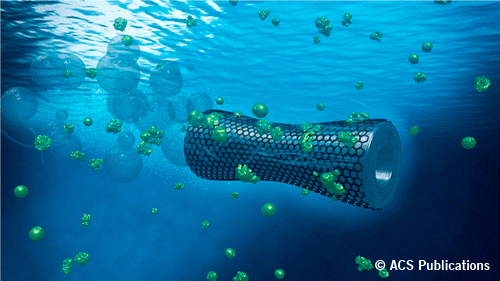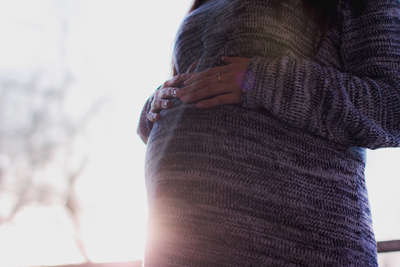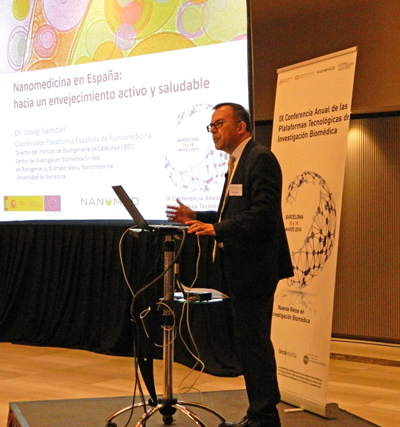Search Results for:
GLAM support for leukemia research
 The GLAM project, of which IBEC’s Biomimetics for Systems for Cell Engineering group leader Elena Martínez is a partner, is supporting the 3rd Festa StandupPaddle (SUP) in aid of leukemia research in Barcelona on 24th April.
The GLAM project, of which IBEC’s Biomimetics for Systems for Cell Engineering group leader Elena Martínez is a partner, is supporting the 3rd Festa StandupPaddle (SUP) in aid of leukemia research in Barcelona on 24th April.
Via the crowdfunding platform “Mi grano de Arena” (My grain of sand), GLAM is collecting donations in for the event, which will involve stand up paddle boarding races, family activities, and much more. All donations made on the website and 75% of the money collected on the day will be forwarded to the Josep Carreras Foundation, a Barcelona-based organisation aiming to make leukaemia a 100% curable disease.
Tiny microbots that can clean up water
 IBEC researchers have developed a self-propelled tiny ‘microbot’ that can remove lead from contaminated water.
IBEC researchers have developed a self-propelled tiny ‘microbot’ that can remove lead from contaminated water.
PhD Position in Medical Chemistry (Ref. MC-PG)
 Application Deadline: 31/03/2016
Application Deadline: 31/03/2016
Ref: MC-PG
The Nanoprobes and Nanoswitches group at the Institute for Bioengineering of Catalonia (IBEC) is looking for predoctoral candidate in Medical Chemistry.
”la Caixa” and Cellex foundations to support research into fetal medicine in Catalonia
 IBEC is to be part of a revolution in fetal surgery and the research of prenatal diseases thanks to support by the Obra Social ”la Caixa” and Cellex foundations.
IBEC is to be part of a revolution in fetal surgery and the research of prenatal diseases thanks to support by the Obra Social ”la Caixa” and Cellex foundations.
The two foundations are set to fund two major projects coordinated by the Fetal Medicine Research Centre, Fetal i+D (Hospital Clínic and Hospital Sant Joan de Déu). A fetal surgery part of the project, promoted by the Cellex Foundation, will improve the interventions currently being carried out, as well as developing new surgery to treat problems that currently lack solutions.
reSearch4Talent 2016
For undergraduate and masters students interested in a research career
reSearch4Talent 2016
For undergraduate and masters students interested in a research career
El present i el futur de la Fibrosi Quística
Una xerrada divulgativa per a estudiants de batxillerat / una taula rodona
El present i el futur de la Fibrosi Quística
Una xerrada divulgativa per a estudiants de batxillerat / una taula rodona
Annual meeting of biomedical research technology platforms
 The Spanish Nanomedicine Platform (NanomedSpain), led by IBEC director Josep Samitier, is once again participating in the annual conference of Spain’s Plataformas Tecnológicas de Investigación Biomédica.
The Spanish Nanomedicine Platform (NanomedSpain), led by IBEC director Josep Samitier, is once again participating in the annual conference of Spain’s Plataformas Tecnológicas de Investigación Biomédica.
At the meeting, which is being held at the Hotel Crowne Plaze today and tomorrow, the keynote speaker invited by NanoMed Spain is Sylvia Bove, CEO of EIT Health. In addition, the Platform is organizing a parallel session on innovation in nanomedicine, in which various projects funded by the European programme H2020 will be presented. These success stories will include IBEC’s Elena Martinez’s ERC Consolidator grant to use biomimetic systems to study intestinal epithelium related diseases, as well as the SME Neos Surgery, which has received funding to complete the development of a new device for spine surgery.

